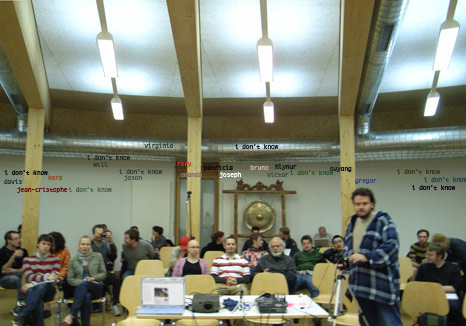a closed door that leaves us guessing
A Closed Door That Leaves Us Guessing
Pedro Costa
1. Masamichi Matsumoto is the director of Athénée Français Cultural Center, and Kazuyuki Yano is the chief of YIDFF (Yamagata International Documentary Film Festival) Tokyo Office.
First, I wanted to thank a few people –- this is going to be a bit like the Oscars, but that’s how it is. I wanted just to say thanks to my mother, to Mr. Yano and to Mr. Matsumoto, because they are the two most important people for me, at least for some time now. (1) They’ve given me a good reason for something that I’ve felt –- that perhaps I’ve loved Japan and didn’t know it. Just as in the cinema, we must meet people, real people, in flesh and blood, to believe in this love. Of course, I thank all the others in the very lovely brochure that you have published, and which gives me great pleasure and honour. All of this is to say that I thank those who I know now and didn’t know before, and that has something to do with what I’d like to say to you today, tomorrow, and the day after – simply, that we can know things through the cinema. Like me, for example, I loved Japan and I knew some things about Japan, without ever having been here before now.
I knew the Japan of films, above all of the three directors most well known in Europe –- namely, Mizoguchi, Ozu and Naruse. I knew Japan through them, these who are dead, who are of another time, but I loved it already, at a distance – and that also is very important in the cinema, to love at a distance. There were things in Japan that I’d never seen in the films of Ozu or Mizoguchi or Naruse, and that I continue not to see in Japan. Here, I launch into a rather complicated subject, for there are things that these directors, or the other great directors I don’t know, hid from me, aspects of Japan that they didn’t show me. Today I’m in Japan and I still don’t see them. That is to say, sometimes in the cinema, it’s just as important not to see, to hide, as it is to show. The cinema is perhaps more a question of concentrating our gaze, our vision of things. That’s what great directors, like these three Japanese, are doing. They are not showing Japan –- they’re condensing something. Instead of scattering your mind, your heart and your senses, they’re concentrating your vision. That’s what I’m always saying: the cinema is made for concentrating our vision. To concentrate means also to hide. It’s a cliché to say that Japan is like the films of Ozu, and the history of Japan is the same as in the historical films of Mizoguchi. Now I understand and I sense Japan better (it’s the same thing: to understand is to feel and to feel is to understand). For example (and you must not laugh now), I have the impression that I don’t see pregnant women on the streets in Japan, and I understand that after having seen the films of Ozu. I know what it means not to see a pregnant woman on the streets of Tokyo. In Ozu’s films, he gives us cues to understand that it’s hidden. That is to say, Ozu prepared me to see this absence of pregnant women. So, sometimes a director who is very much a realist, working almost in a documentary mode like Ozu, sometimes he makes films also to hide something. There’s a secret somewhere in his films, and to assert certain things he must hide others. Maybe it’s necessary to step a bit outside of Japan, because what I’m about to say could make you uncomfortable, I don’t know … but for me, the true Japanese documentaries are by Ozu. All the people I know in Japan, all my Japanese friends, I knew before, through the films of Ozu. What I’ve just said, Ozu has written in his journal. He says: ‘I’ve never made up a character. In my films, I make copies of my friends.’
Posted by lucio | reply »the inside and the outside and the secret of the fear of the fear
Â
“It is true, part of us has disappeared, but reality itself remains. The fact that, today, we can say that the geography of the outside has changed, that the outside no longer exists, that we are all enclosed within, means that, at the same time, the outside is everywhere. But we should have to be able to divide the division to recover what is left.
It is a trap we accept and that maintains the fiction of ‘this totality’ which paralyzes us as much as it amputates a part of us. And thus we are not, not even sentimentally, without strength and courage in our zeal to maintain a worrying normality which we have not really chosen.Â
(…) this is the reason why what we can still recover no longer concerns ourselves but our remains; I believe this is the only hope we have for simply making use of our lives. For we can no longer separate ourselves from what is incrusted within us. We can no longer lose ourselves, because we are already almost no longer here. However, we can try to abandon ourselves there where we are shattered in a thousand pieces and perhaps recover our outside. and i am not in a position to say whether, in this case, the form does not come anymore than it leaves.” (alejandra riera, enquiry into the/our outside)
(reading through old notebooks, looking for things to hold on to, lines becoming blurry, the summer dissolving in front of our eyes..)
Posted by f | reply »wearing/tracing Posted by anyway | reply »
手势检查第二: æ‹å¤´å‘ | gesture study 2: hair-ing Posted by 丫 | reply »
buttoning
gesture study 1: buttoning/unbuttoning (work in progress)
a project about the relationship between individual and object, in this case a button, the stories it may contain and the gestures associated with its use. in collaboration with hiroaki kanai.
Posted by f | reply »ç†å˜å¥æ›² variations on lÇ
filmed in new york city, autumn 2006. summer 2008 finally got around to… thank you sim-chan and aka-chan and D-chan!
Posted by 丫 | reply »re:
Barthes references the “obtuse meaning” as beyond signification, where it is neither informational nor symbolic. There is no proper structure; it is a signifier without a signified, hence the difficulty in naming or identifying. “If the obtuse meaning cannot be described, that is because, in contrast to the obvious meaning, it does not copy anything—-how do you describe something that doesn’t represent anything?” (from notes, seminar of Hubertus von Amelunxen, Saas-Fee June 2008)
Posted by 丫 | reply »

